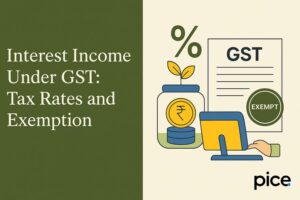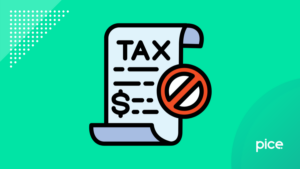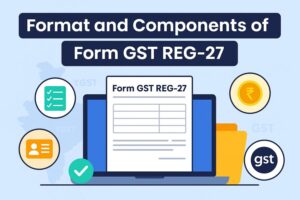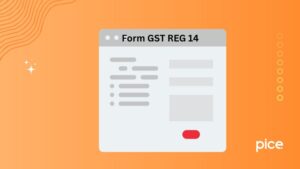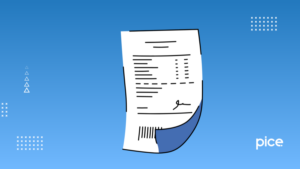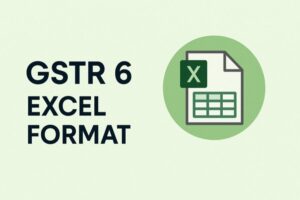PICE: The Best GST App in India
- 18 Aug 24
- 19 mins

PICE: The Best GST App in India
- Who needs GST software?
- Why Do You Need GST Software?
- What Does GST Software That Is Cloud-based or On-premise Mean?
- Choosing the Right Option
- Features of GST Billing and Accounting Software
- Benefits of of Using PICE GST Billing Software
- Choosing the Right GST Software for Your Business
- Send Payment Reminders to Recover Dues
- Conclusion
Key Takeaways
- User-Friendly Interface: Choose GST software that is easy to use, helping small businesses manage their taxes without needing extensive accounting knowledge.
- Tax Return Assistance: Opt for GST software that offers automated features for preparing and filing tax returns directly from the platform.
- Cloud Benefits: Select cloud-based GST software for its accessibility, scalability, and cost-efficiency, especially suitable for growing businesses.
- System Integration: Ensure the GST software can integrate seamlessly with existing business systems like ERP and accounting software to enhance data accuracy and workflow.
- Vendor Support: Look for a GST software vendor that provides excellent customer support, regular updates, and robust security features to maintain compliance and data safety.
In today's fast-paced business environment, managing finances efficiently is crucial. Goods and Services Tax (GST) has transformed the tax framework in many regions, making it imperative for businesses to have robust GST billing software. This comprehensive guide will explore the best GST billing software for 2024, detailing how it can streamline your taxation processes.
Who needs GST software?
In the modern financial ecosystem, Goods and Services Tax (GST) has become a pivotal element, especially after its implementation in various countries like India. GST software streamlines the process of managing and filing GST returns, which can be a complex task involving multiple stages of documentation and compliance.

But who exactly needs GST software? This section discusses various entities that require GST software to ensure efficient handling of their tax obligations.
- Business Owners and Entrepreneurs
For business owners, both small and large, GST software is a necessity rather than a luxury. It assists in automating the tax calculation process, generating GST-compliant invoices, and filing returns on time, thereby preventing penalties associated with non-compliance or late filings. Businesses involved in buying and selling goods or providing services across state lines particularly benefit from GST software, which simplifies the intricacies of inter-state taxation.
- Accountants and Financial Professionals
Professionals in accounting and finance roles find GST software invaluable for maintaining accurate records and simplifying their daily workflows. The software provides tools to handle bulk transactions efficiently and ensures that every financial entry adheres to GST norms, which is critical for audit and compliance purposes.
- Freelancers and Service Providers
Freelancers, particularly those who service clients from different states or countries, need GST software to manage diverse tax rates and rules. The software helps in issuing proper invoices with the correct tax amounts and keeps track of all transactions for hassle-free tax filing at the end of the fiscal period.
- E-commerce Platforms
E-commerce businesses deal with a multitude of transactions daily, often involving multiple states or regions with varying GST rates. GST software helps these platforms by automatically calculating the right tax rate for each product category and region, ensuring that the business remains compliant with tax laws across all operational areas.
- Manufacturers and Wholesalers
Manufacturers and wholesalers manage a vast network of suppliers and buyers, making GST compliance a significant challenge. GST software aids in integrating all stages of the supply chain—from procurement to sales—under a unified tax framework, ensuring seamless compliance and reporting.
- Startups
Startups, especially in their early stages, can benefit immensely from GST software. It helps in setting up a compliant accounting system right from the start, which is crucial for scaling the business while staying compliant with tax regulations.
- Retailers
Physical and online retailers dealing with a wide variety of goods often struggle with the correct application of GST rates. GST software automates this aspect, allowing retailers to focus more on their business operations than on tax calculations.
Why Do You Need GST Software?
In the realm of modern business operations, compliance with tax regulations is paramount. GST (Goods and Services Tax) software serves as a crucial tool for businesses, streamlining the process of tax compliance, enhancing financial accuracy, and ensuring operational efficiency. Here’s a detailed exploration of why you need GST software, including the integration of relevant keywords to highlight its importance.
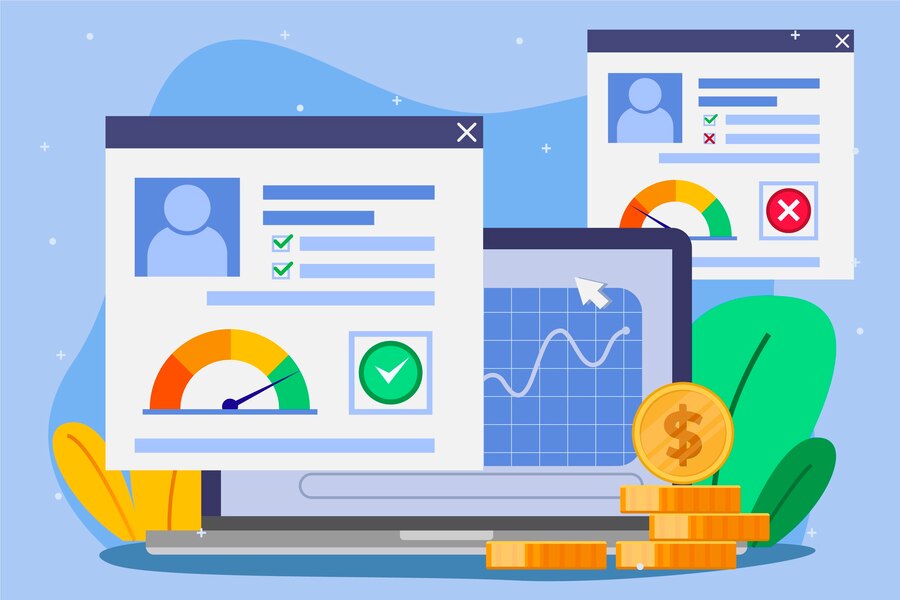
- Automation of Tax Calculations
GST software automates the calculation of GST for various transactions, which reduces human errors and ensures accuracy in tax reporting. This is essential for maintaining compliance with tax authorities and avoiding costly penalties.
- Efficient Management of Invoices and Bills
Professional invoices and accurate billing are vital for business's reputation and financial management. GST software facilitates the generation of GST-compliant invoices, handling of purchase invoices, and management of unpaid invoices. This helps businesses maintain clear and professional financial dealings with vendors and customers.
- Seamless GST Filing and Return Processes
The complexity of GST filings and returns demands meticulous attention to detail. GST software simplifies this process by providing tools to manage GST filings efficiently, including preparing and submitting returns directly to the GST portal. This capability ensures timely submissions and helps avoid discrepancies that could lead to audits or fines.
- Integration with Financial Systems
GST software typically integrates seamlessly with other financial systems, such as accounting software, ERP systems, and payment gateways. This integration supports comprehensive financial management, from payment tracking to expense tracking, and provides a centralized platform for managing all financial aspects of a business.
- Access to Real-Time Business Insights
Advanced GST software offers smart analytics and graphical reports, which provide insights into business performance, inventory status, and financial health. These reports help business owners make informed decisions and improve operational strategies based on accurate data.
- Support for Multiple Business Needs
Whether it's handling e-way bills, managing inventory through intelligent billing software, or offering features for offline mode operation, GST software caters to a wide range of business needs. This versatility makes it an indispensable tool for any business, especially those operating under varying compliance requirements across different states or countries.
- Enhanced Data Security and Backup
With concerns over data security and the need for reliable backups increasing, GST software provides solutions that include automatic data backup. This feature ensures that financial data is protected against loss due to hardware failure, cyber threats, or human error.
- Compliance with GST Suvidha Provider (GSP) Requirements
For businesses in regions like India, where GST Suvidha Providers play a crucial role in tax administration, using compliant GST software is mandatory. These platforms ensure that all GST-related services are accessible and that the business adheres to the latest GST norms and regulations.
The PICE business payment app is not just a requirement but a significant asset for businesses aiming to enhance their compliance, efficiency, and overall financial management. By automating key tasks, providing valuable insights, and ensuring compliance, GST software stands as a cornerstone of modern business operations.
What Does GST Software That Is Cloud-based or On-premise Mean?
GST software can be hosted in two main ways: cloud-based and on-premise. GST (Goods and Services Tax) software plays a critical role in tax compliance and accounting. Choosing the right type of deployment—cloud-based or on-premise—is crucial for businesses to optimize their GST management processes.
Here, we explore what these terms mean and the implications for businesses, including the integration of keywords such as GST accounting software, mobile apps, and financial reports.
- Cloud-based GST Software
Cloud-based GST software refers to applications hosted on a provider's servers and accessed over the internet. This model offers several advantages:
- Accessibility: Users can access cloud-based GST software from any device with an internet connection, including mobile apps, enhancing flexibility for on-the-go business management.
- Cost-Effectiveness: Typically, cloud software is available on a subscription basis, which reduces upfront costs. Businesses pay for what they use without worrying about maintenance or upgrades.
- Scalability: Cloud solutions are highly scalable, allowing businesses to add features or storage space as needed without significant downtime.
- Integration: Cloud-based GST software often integrates seamlessly with online billing software, banking platforms, and other financial services, providing a comprehensive view of financials and enhancing the efficiency of business reports and tax filings.
- On-premise GST Software
On-premise GST software is installed and runs on a company's own computers and servers. This setup provides:
- Control: Businesses have full control over their GST software and data, which is crucial for organizations with stringent data security guidelines or those operating in industries regulated for data sovereignty.
- Performance: On-premise solutions typically offer faster data processing because they do not depend on internet connectivity. This can be essential for generating financial reports or handling complex inventory management tasks.
- Customization: Companies can extensively customize on-premise software to suit specific needs, which might include unique billing tools or specialized reporting features.
Choosing the Right Option
The decision between cloud-based and on-premise GST software depends on several factors:
- Business Size and Complexity: Small to medium businesses often benefit from the cloud's cost-effectiveness and simplicity, while large enterprises might prefer the control and customization offered by on-premise solutions.
- Internet Connectivity: Businesses in areas with unreliable internet access might opt for on-premise software to avoid disruptions in their operations.
- Regulatory Requirements: Some sectors have regulations that dictate how and where data must be stored, which can influence the choice.
Features of GST Billing and Accounting Software

GST (Goods and Services Tax) billing and accounting software is a cornerstone for businesses managing their tax obligations efficiently. Pice, the top GST billing software, comes packed with features designed to simplify your financial processes of tax compliance, billing, and financial management.
- Automated Tax Calculation
One of the primary features of GST software is its ability to automate the calculation of taxes for different types of transactions. This includes determining applicable GST rates for various products and services, managing input tax credits, and ensuring accurate tax amounts on invoices, which is vital for compliance and audit readiness.
- User-Friendly Interface
A good GST software comes with an intuitive user interface that simplifies navigation and makes it easy for users to manage their accounts without extensive training. This includes dashboards, drag-and-drop functionalities, and easy access to all features from the main menu, enhancing the user experience for both desktop and mobile users.
- Comprehensive Billing Capabilities
GST software provides robust billing features that support the creation of professional-looking invoices, management of non-GST bills, and customization of invoice templates. It also handles billing cycles, recurring payments, and can process payments through various methods, including credit cards and bank transfers.
- Detailed Financial Reporting
Advanced reporting features are crucial in GST software, enabling businesses to generate smart reports, accurate financial reports, and smart analytics reports. These reports offer insights into business performance, help track sales, monitor inventory levels, and manage business records efficiently.
- Seamless Data Integration
Effective GST software integrates seamlessly with other business systems, such as ERP software, accounting software providers, and CRM systems. This integration facilitates the flow of information across platforms, improving accuracy in financial data and ensuring consistency in records.
- Multi-Currency and Multi-Lingual Support
To cater to global businesses, GST software often supports multiple currencies and languages, which is particularly beneficial for companies operating in diverse geographic locations. This feature ensures that businesses can manage transactions in different currencies and comply with local tax regulations.
- Cloud-Based Accessibility
Many modern GST software solutions are cloud-based, allowing users to access their financial data anytime, anywhere. This supports remote working scenarios and provides businesses with flexibility and scalability. Cloud-based GST software often comes with automatic updates and data backups, ensuring that the system is always up-to-date with the latest tax laws and security protocols.
- Security and Compliance
Security features in GST software include secure data encryption, role-based access control, and compliance with local GST laws and ISO certifications. These features are crucial for protecting sensitive financial information and ensuring that the business complies with tax regulations and standards.
Benefits of of Using PICE GST Billing Software
PICE GST Billing Software offers a comprehensive suite of features that streamline the accounting and taxation processes for businesses. It's designed to meet the needs of modern enterprises, from small startups to large corporations, especially those operating in India where GST compliance is crucial.
Below, we discuss the key benefits of using PICE GST Billing Software, highlighting its essential features and how they contribute to business efficiency and compliance.
- Seamless Integration with Banking Systems
PICE GST Software supports seamless integration with bank accounts, facilitating automatic reconciliation of financial transactions. This integration helps in maintaining accurate records, enhances payment methods, and streamlines the process of financial reporting and tax filing.
- Advanced Reporting Capabilities
The software comes equipped with tools to generate accurate reports, including sales reports, GST return filings, and analysis reports. These smart analytics reports are essential for maintaining proper account management and help businesses monitor their financial health, optimize their tax liabilities, and make informed decisions.
- Customizable Invoicing Solutions
PICE GST Billing Software provides customizable invoicing solutions that enable businesses to create professional customer invoices, manage GST invoice details, and adjust invoice themes to match the business branding. This flexibility helps maintain a positive brand image and ensures compliance with GST invoicing standards.
- Desktop and Mobile Accessibility
The availability of a robust desktop application along with a mobile application ensures that users can access their financial data and perform essential tasks from anywhere. This dual-platform accessibility is particularly beneficial for businesses that require constant updates on their financial status and wish to manage operations on the go.
- Comprehensive GST Compliance
PICE GST Software is designed to handle all aspects of GST compliance, from basic usage to complex GST return filing software requirements. It supports service tax calculations, manages input tax credits effectively, and ensures that businesses stay compliant with all GST-related regulations.
- Efficient Payroll Management
Apart from core accounting and GST features, the software also offers payroll management tools. These tools help businesses manage employee salaries, deductions, and tax withholdings, streamlining the entire payroll process and ensuring compliance with employment laws and tax regulations.
- Enhanced Data Security
With features like automatic backup and secure data handling, PICE GST Software ensures that all financial data remains safe from unauthorized access and data breaches. This security is crucial for maintaining trust and upholding a business’s reputation.
- Positive Impact on Business Performance
By automating and simplifying complex processes like GST filings, expense management, and financial reporting, PICE GST Billing Software enables businesses to focus more on strategic activities rather than administrative tasks. This can lead to improved overall business performance and efficiency.
Choosing the Right GST Software for Your Business
Selecting the appropriate GST software is crucial for efficient financial management and compliance, especially in regions like India where GST regulations are stringent. The right software can simplify your taxation process, enhance your filing status accuracy, and streamline both domestic and international payments.
Here’s how to choose the ideal GST software for your business, with a focus on features that matter the most.
- Assess Your Business Needs
The first step in choosing GST software is to understand your specific business requirements. For instance, if your business deals with a lot of custom invoices or has complex billing cycles, you’ll need software with advanced invoicing capabilities.
Consider factors like the size of your business, the volume of transactions, the complexity of your supply chain, and any specific industry needs, such as software for construction businesses or startups.
- Look for Essential Features
A good GST software should offer comprehensive features that cover all aspects of GST compliance:
Automated Tax Calculations: To reduce errors and save time.
GST Invoicing and Accounting: For generating GST-compliant invoices and managing accounts efficiently.
Intelligent Billing Software Features: To handle different billing scenarios and client requirements.
Filing status Updates: To keep track of your GST returns and any changes in filing requirements.
- Consider the Software’s Usability
Choose software with a user-friendly interface, especially if many team members who may not have advanced technical skills will be using it. Accessibility through both desktop and mobile platforms is a plus, ensuring you can manage your finances on the go.
- Evaluate Integration Capabilities
Your GST software should seamlessly integrate with other systems you are using, such as CRM, ERP, or accounting tools. This integration helps in maintaining data consistency and accuracy across all business operations.
- Check for Scalability
The GST software you choose should be scalable to accommodate your business's growth. Look for options that offer flexible GST software plans and additional features that you can add as your business expands.
- Support and Customer Service
Reliable customer support is crucial. Ensure that the GST software provider offers comprehensive support through tutorials, FAQs, and customer service channels. This is particularly important during the initial setup phase or when migrating from another system.
- Security Features
Given the sensitive nature of financial data, ensure that the software provides robust security measures, including data encryption, secure login protocols, and regular backups.
- Cost Efficiency
Finally, compare the costs of different GST software providers. While affordability is important, it should not compromise the essential features and support you need. Sometimes, investing a bit more in a robust system can save you money in the long run by avoiding compliance issues and system inefficiencies.
Send Payment Reminders to Recover Dues
Effective financial management is pivotal for any business, especially when it comes to recovering payments on time. GST billing and invoicing software can significantly enhance this aspect by automating the process of sending payment reminders. Here's how leveraging this capability within your GST software can help you streamline dues recovery and maintain a healthy cash flow.

- Automating Payment Reminders
Most GST invoicing and accounting software come equipped with features that allow businesses to automate the dispatch of payment reminders to clients. This functionality ensures that reminders are sent out before and after the payment due date, reducing the manual effort needed to track each invoice.
- Customizable Reminder Templates
To maintain professionalism and clarity, GST software often allows for the customization of payment reminder templates. Businesses can tailor the language and format of these reminders to match their brand and communication style, ensuring consistency across all communications. This feature is particularly useful in maintaining a positive relationship with clients while addressing payment issues.
- Integration with Billing Systems
Intelligent billing software integrates payment reminders with the overall billing system. This integration allows for real-time updates on the status of invoices and payments, helping businesses quickly identify which clients have outstanding dues and need reminders. The ability to access this function through a desktop app enhances user convenience, particularly for businesses that manage their finances primarily from office settings.
- Tracking Payment Status
GST software with integrated payment reminder systems often includes features to track the status of payments. Once a reminder is sent, the software can update the payment status based on client actions, such as acknowledging the reminder or completing the payment. This helps businesses keep accurate records of all transactions and reduces the risk of disputes over payments.
- Support for Multiple Payment Methods
To facilitate quicker payment processing, GST billing software can include support for multiple payment methods. By providing options such as credit cards, bank transfers, and online payment solutions, and clearly stating these in payment reminders, businesses can make it easier for clients to settle their dues promptly.
- Enhanced Financial Reporting
With all payment data integrated into the GST software, businesses can generate accurate financial reports that reflect their cash flow and financial health. These reports can inform strategic decisions, such as budget adjustments and financial forecasting.
- Compliance with GST Regulations
For Indian businesses, ensuring compliance with GST regulations is critical. GST software helps manage not only the invoicing and payment processes but also ensures that all financial transactions are compliant with GST norms. This includes maintaining records of all payment reminders and their outcomes, which is essential during GST audits.
Conclusion
Choosing the right GST billing software is crucial for efficient business management. Pice is the best GST software that meets every business's specific needs and helps ease the burden of GST compliance.
The ideal software not only simplifies the complexities of tax compliance but also enhances overall operational efficiency. By automating tax calculations, integrating seamlessly with existing business systems, and providing essential features like invoice management and financial reporting, the right GST software helps businesses stay compliant, make informed decisions, and maintain a healthy financial status
 By
By 








